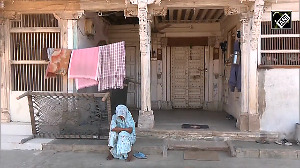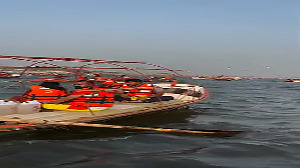
Uncharitable critics deride them as the loony fringe. Angry corporations dub them Luddites. Governments ignore them, at best, or drive them underground, at worst.
But undaunted by it all, thousands had gathered for the last three years in Port Alegra in Brazil dreaming of a different world. In January next year the city that never sleeps -- Mumbai -- will play host.
Called the World Social Forum, and pegged as a counter to the World Economic Forum, it is the place where people dissatisfied with the current world order and socio-economic systems fostered by it come together to dream of a different world and discuss ways to achieve it.
'Another World is Possible' is their catch line and the people involved with organising this event are excited and raring to go.
"After all it is the largest annual global event that challenges imperialism and neo-liberal globalisation. About 75,000 people from across the world will come together in Mumbai and discuss strategies to build a more just, people-centred world order," says Minu Jose, facilitator of the media committee, WSF 2004.
The excitement becomes understandable when one realises that it is for the first time ever that the event has moved out of Brazil into Asia. It is, let's say, akin to the World Economic Forum leaving Davos and nestling in Mumbai. The icing on the cake, if one goes by what the organisers say, might well be the presence of Nelson Mandela and Noam Chomsky at the January 16-21 event.
But like many alternative systems of thought pitted against global capitalism it is an effort to negotiate its thought process, peppered as it is liberally with jargon. One such example is the charter of principles.
'The World Social Forum is an open meeting place for reflective thinking, democratic debate of ideas, formulation of proposals, free exchange of experiences and inter-linking for effective action, by groups and movements of civil society that are opposed to neo-liberalism and to domination of the world by capital and any form of imperialism, and are committed to building a society centred on the human person,' says one of the 14 principles put forward in the charter.
Damayanti Bhattacharya's Vikas Adhyayan Kendra is one among the 190 Indian non-profit and non-governmental organisations participating in the Forum. The WSF, she explains, is a place for individuals and organisations opposing the current model of development -- based on free market liberalism -- and a culture dominated by globalisation.
And opposing is not all that we do, she adds. "We discuss and negotiate issues among ourselves. It might take a long time for a result to come out. After all there are differences among us too. But the beauty of it is our belief in the democratic process of discussion and debate. Once a consensus is evolved we do come up with alternatives too," she explains.
The WSF has its genesis in the numerous anti-globalisation marches that marked the last legs of the 1990s. These protest marches, in places like Seattle, Washington, Prague, Nice, coincided with increased integration of world trade through multilateral policy initiatives decided at fora like the WEF and the World Trade Organisation.
The common factor that defined such protest marches was the strident opposition to the increasing power of corporations in defining who eats and drinks what, thinks how and works when and where. Out of these protests evolved an understanding that the future lay in 'people-centred and self reliant progress'. That understanding took a concrete form when the first WSF meet was organised in Porta Alegre in 2001. Since then two more such meets were organised -- in 2002 and 2003 -- both at the same place.
But how the WSF came to India is a story in itself. Chandita Mukherjee, currently the cultural committee facilitator of the WSF but otherwise a documentary filmmaker, explains. "The Asian Social Forum, which is the regional version of the WSF, held its meeting in Hyderabad between January 2-7. Though we anticipated around 8,000 participants, close 22,000 landed up! The entire atmosphere was like that of a festival. There were discussions all around. If people liked what was being said there would crowds milling around the speaker. But if it was not to their liking, then the speakers will have fewer listeners. Never was anyone told not to put across a point of view. Everything was democratic. The response, and its maturity, was what gave us the idea of shifting the WSF to India."
But the WSF is not a homogenous entity. And the first one to admit it is Bhattacharya, who doubles up as a facilitator of the media committee. It cannot be a uniform body, she says, simply because the definition of globalisation is very fluid.
While, some like the All India Trade Union Congress, exclusively identify globalisation as an extension of capitalism, others, like Bhattacharya's Vikas Adhyayan Kendra, consider globalisation to be a cultural phenomena.
The participation of central trade unions like AITUC and CITU may be an indicator of the reorientation in the thinking of their parent organisations. For long both the Communist parties had kept away from such events due to their ideological position that gave primacy to the working class, often to the exclusion and detriment of other groups.
Their participation may mean that the Communist parties now look upon themselves as one among the many groups opposing globalisation, rather than the leader of such groups.
Many disparate voices also emerge from the WSF because it is a coalition of groups having varied interests. WSF media committee facilitator Minu Jose, who works with Combat Law, which is a magazine devoted to human rights issues, conceives globalisation as a force that is bringing about uniformity, often perilous, in laws.
POTA in India and the Patriot Act in the US are globalised responses of nations to globalised terror, Jose says. These legal responses, she adds, often erode the democratic fabric of nations. On how some developed nations are able to resist the globalisation of legal structures, Jose gives the example of the US, which has been opposing tooth and nail the proposal for an International Criminal Court.
But the WSF is not just a forum for organisations and groups opposed to globalisation. Even individuals participate and volunteer to help out the WSF organisers. One such example is Dr Sanjay Nagral, who has a flourishing medical practice.
Ask Dr Nagral why and the articulate doctor says: "I am against the privatisation of healthcare. It has led to the commercialisation of an essentially humane profession. It has also resulted in unethical practices."
For instance, says Dr Nagral, the ultrasound clinics that have cropped up all over India cater to those people who want to determine the gender of an unborn baby. An essentially good technology is used in an unethical fashion, he adds. The doctor is also against, as he puts it, 'unnecessary operations and tests' that have been brought about by private healthcare. Dr Nagral has managed to rope in like-minded doctors under one roof in Forum for Medical Ethics and Medicofriends.
For someone used to structured conferences and seminars the WSF might appear to a hydra-headed giant speaking in multiple voices. Mukherjee, however, puts their effort in perspective. "It should not be seen as a serious, academic event. There will be street plays, folk songs, impromptu discussions, puppetry... It is more of a cultural event. The idea is to show people that fun need not mean only page three people and parties. We will also have fun and through that we will try to evolve solutions to the many problems faced by all of us."
Design: Lynette Menezes






 © 2025
© 2025